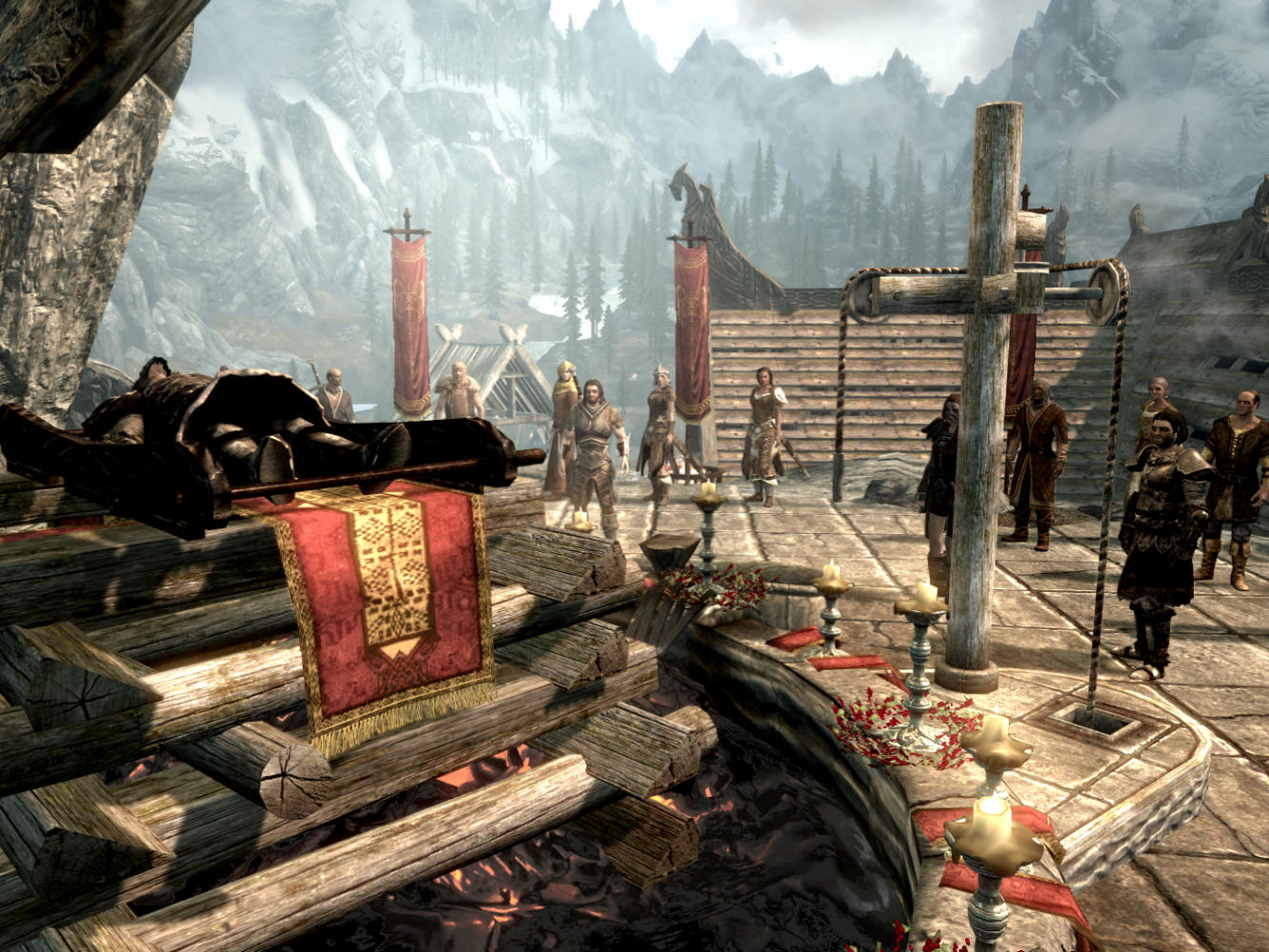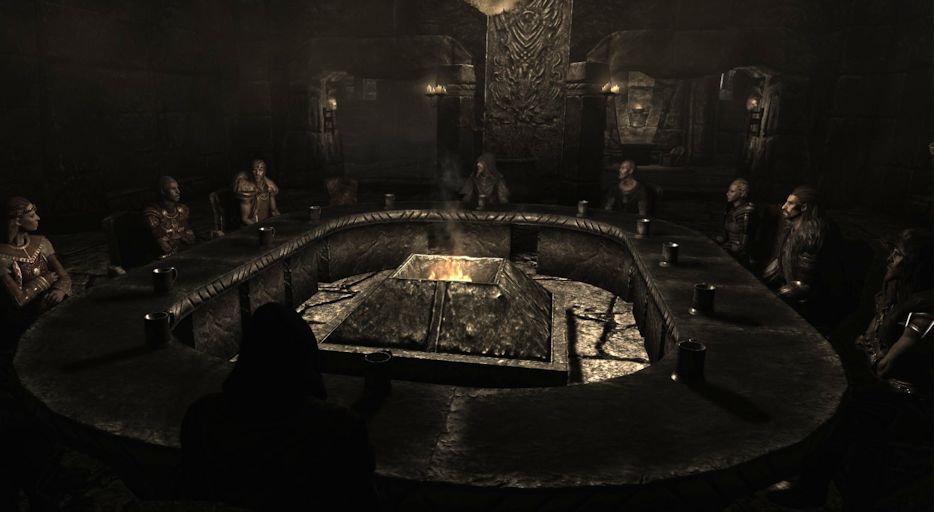Ill Met By Moonlight is a Daedric quest involving Hircine, the Daedric Prince of the Hunt.
It began in Falkreath, where I met Mathies and Idara, farmers who were
grieving the brutal murder of their young daughter. They tearfully reported that an itinerant
laborer on their farm had torn their little girl to pieces, like a wild
animal. That laborer, Sinding, was now
in the city jail awaiting trial for his crime.
When I visited Sinding, he admitted both to being a werewolf
and to killing the girl, but claimed that her death wasn’t really his
fault. Apparently, in an effort to
control his transformations, he stole the Ring of Hircine. The Daedric Prince, supremely displeased with
Sinding’s temerity, cursed the ring so that he was now transforming at
random. It was during one of these
random transformations that he killed the little girl. Before he was arrested, he came to the
conclusion that he needed to win back Hircine’s favor by hunting and killing a
rare beast – the White Stag. Obviously,
being in jail made his plan untenable, so he asked me to help him by taking the
ring and hunting the White Stag for him.
The first moral dilemma was, of course, whether to help
Sinding. Regardless of whether I
believed his story or his remorse, he killed a child, so I was not inclined to
help. However, so long as Sinding
possessed this ring, he was a threat to everyone, including his jailers, if for
no other reason than Hircine would probably not stop until he was
satisfied. Furthermore, Sinding was
already incarcerated and would most likely be executed, so there was no need
for me to break the law by taking justice into my own hands.
The second dilemma involved the ring itself. As a werewolf myself, if I took the ring, I would
also take on the curse of random transformation. In my consideration of the Companions
questline, I discussed the moral implications of lycanthropy in some
detail. Ultimately, I concluded that
being a werewolf in Skyrim is morally
neutral because the PC can not only choose when to transform but is also in
complete control of his actions when transformed. If choice is removed but control is retained,
as seemed to be the case with the cursed ring, then the issue becomes only
slightly more complex. If I were to
transform in the marketplace, for example, I would immediately draw the
hostility of every witness, and would therefore have to choose among fighting
innocent people, running away as fast as possible, or dying. Given my previous experiences with Beast
Form, decided that it was a calculated risk worth taking.
Once I agreed to take the ring, Sinding did something that,
had I anticipated it, would have led me to kill him in his cell, regardless of
the legal penalty. As soon as the ring
was in my possession, he transformed voluntarily and escaped out of the hole in
the high ceiling of his cell. The lesson
here is that even the most carefully thought-out moral plans can have
unintended consequences.
As much as I wanted to hunt Sinding down, I now had to deal
with the curse, so I decided that the best course of action would be to hunt
the White Stag and get Hircine’s attention as soon as possible. Fortunately, I completed this stage of the
quest quickly, only transforming right after I killed the White Stag out in the wilderness. Hircine did in fact appear and informed me
that Sinding was hiding out in Bloated Man’s Grotto and that he had already
sent other hunters after him. Knowing
that the hunters would probably be no match for a desperate werewolf, I headed straight
for the Grotto.
When I arrived, I found that my suspicions were correct;
Sinding had already killed several of the hunters. I felt bad about my role in their deaths, but
as they were evidently Hircine’s cultists, and therefore a brutal lot to begin
with, I did not lose much sleep over it.
I tracked down Sinding, at which point he asked that I let him go. His plan was to live in the wilderness, far
away from innocent people who could be hurt by his Beast Form. All I would need to do was to kill the
remaining hunters.
This third moral crossroads was, despite its climactic
nature, the easiest one to navigate. Sinding had to die; even if I had confidence in his plan (which I didn't), he needed to pay for his crime. As I pointed out earlier, Bethesda is clearly capable of
writing an “addiction mechanism” (progressive ability and attribute penalties
for non-compliance) for their games, as evidenced by their handling of
vampirism. Had they chosen to do so, they could have created a similar system
for lycanthropy. The fact that they
didn’t leads me to the conclusion that Sinding’s desperation is purely psychological. Even Aela, who presents as a bit too
enthusiastic about her Beast Form, is always in control, even as a wolf. Therefore, Sinding’s uncontrollable blood
lust is a psychological condition at best, and a manipulative mask for his
sociopathology at worst. To drive this
point home even further, I myself transformed before I killed him, thus
infusing Sinding’s execution with a touch of poetic justice.
 |
| Nope. |
After I killed Sinding, Hircine appeared once again to
reward me for a successful hunt; the Daedric Prince gave me enchanted armor
made from Sinding’s own skin, which was gruesome and not all that
powerful. The real prize for me was the
chance to put down a vicious child-killer.
In my usual post-quest research, I learned that I could have
double-crossed Sinding and received two different Daedric artifacts – the
aforementioned armor (the Savior’s Skin) as well as the Ring of Hircine, which
allows the wearer to transform as often as he wishes. To gain both prizes, I would have had to
agree to help Sinding, kill the remaining hunters, collect the ring from
Hircine, then return to kill Sinding and collect the armor. While I would have had minor qualms about
deceiving Sinding (he deserved to face his execution head-on), I would have had
a very hard time justifying the killing of the hunters. As Hircine’s cultists, and therefore big game
hunters, they accepted the possibilty of death at the claws of their prey, not
murder at the hands of their comrade.
The ring is certainly the better prize, but it was not worth the lives
of the hunters.



